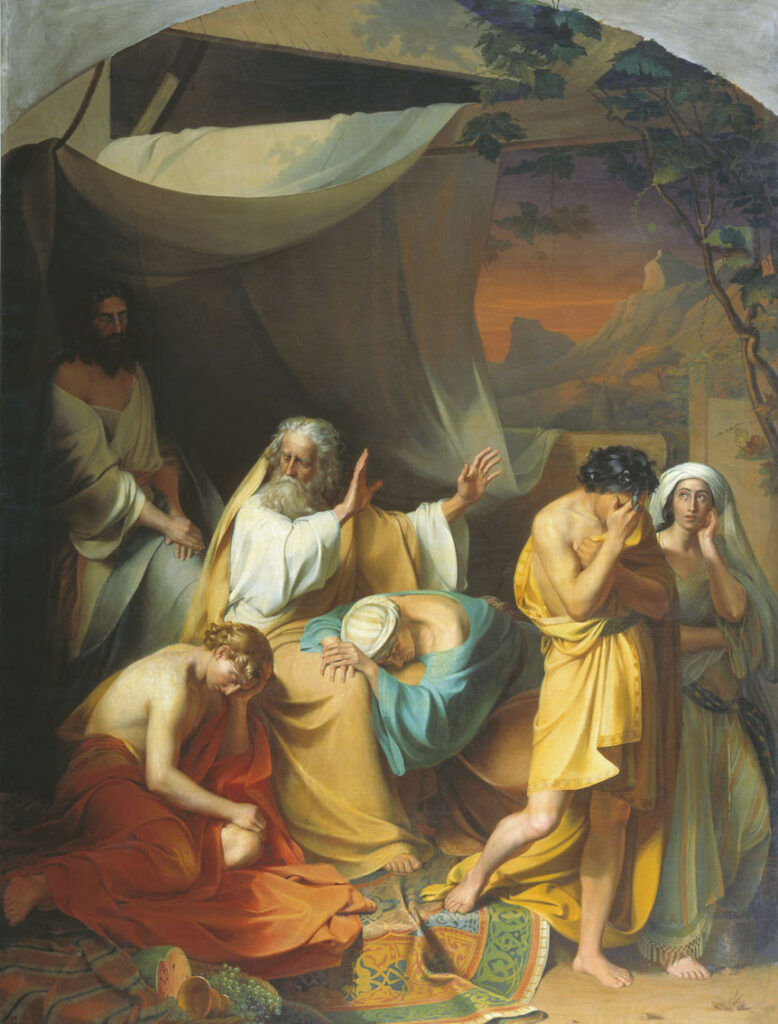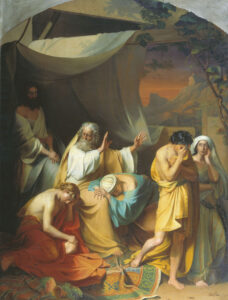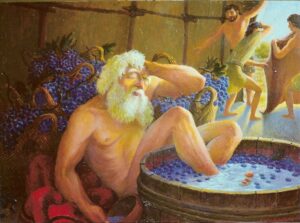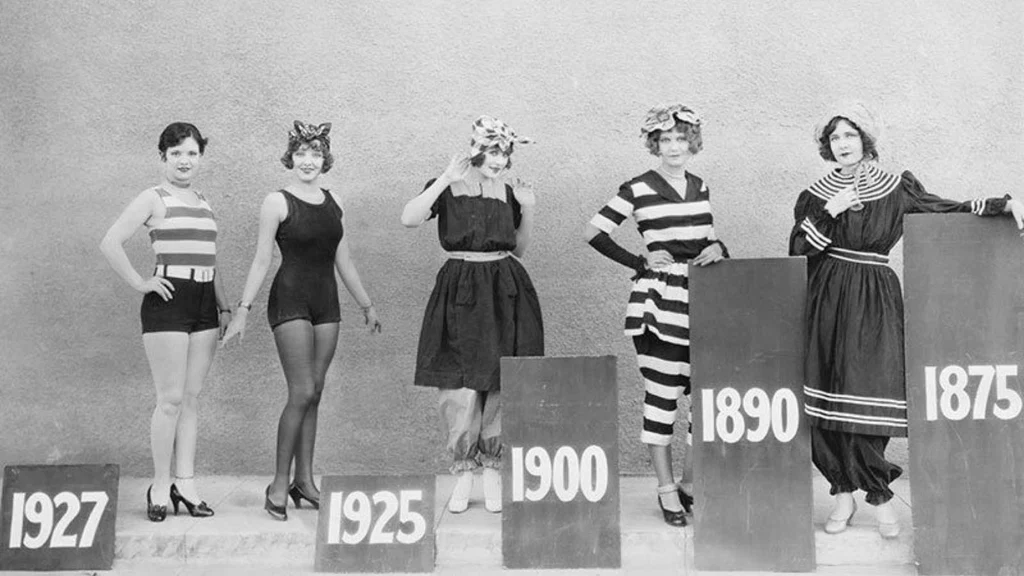
The hero that saved humanity, Noah gets drunk, passes out naked and is shamed by his son.
20 Noah was the first tiller of the soil. He planted a vineyard; 21 and he drank of the wine, and became drunk, and lay uncovered in his tent. 22 And Ham, the father of Canaan, saw the nakedness of his father, and told his two brothers outside. 23 Then Shem and Japheth took a garment, laid it upon both their shoulders, and walked backward and covered the nakedness of their father; their faces were turned away, and they did not see their father’s nakedness. 24 When Noah awoke from his wine and knew what his youngest son had done to him, 25 he said,
“Cursed be Canaan;
a slave of slaves shall he be to his brothers.”
26 He also said,
“Blessed by the Lord my God be Shem;
and let Canaan be his slave.
27 God enlarge Japheth,
and let him dwell in the tents of Shem;
and let Canaan be his slave.”
Noah Gets Drunk and Passes Out Naked
Noah, a man chosen for his righteousness, now gets drunk and passes out naked. He just saved the world a chapter earlier! Now we read he knows how to make wine, he gets drunk and passes out naked. So many question marks in this story about our guy Noah. This behavior is just not what you expect.
If you read this without anyone else’s theory or explanation it doesn’t seem to make sense. A very straightforward understanding of this story would sound like this: Ham goes into his father’s tent. Sees his father passed out and naked. Comes back out and tells his brothers. They don’t want to see their father naked so they walk in backwards. They drop a blanket on him without looking. They some how assume they got the job done. Leave the tent. Noah wakes up the next day and somehow knows that Ham did something to him, so he curses Ham’s son Canaan.
At face value, it doesn’t make any sense. It doesn’t say that Ham mocked his father. It just says that he saw it, walked out and told his brothers. What tells me that we have to assume that something more happened that the story doesn’t tell us is where it says, “When Noah awoke from his wine and knew what his youngest son had done to him” We don’t know what he had “done” to him, but that verse lets us know that he had done something to him.

Let’s say I am married, and my wife and I are at a party. And I am needing to use the bathroom really bad. The downstairs bathroom is locked so I figure there is a bathroom connected to the master bedroom, I’ll use that one. So I walk in and see my friends wife passed out naked on the bed. So I walk out and tell my wife what happened and so she goes in and covers her up. The next day my friends wife tells him what I did to her because she knows what I did to her.
Anyone hearing that would feel like there is more to that story. Something happened that is not being revealed. Either my friends wife is making it up or I am lying but something happened. What did Noah know that Ham did to him? What if we were to investigate this story take it to trial?
So I am going to attempt to do that here. But first I want to explore a little bit of background. I am not a scholar but because I have an unquenchable curiosity that drives me to make this story make sense. So I did a little digging and here is what I have found.
Theological Summary: Genesis 9:20–27 and Its Relation to Leviticus 18
Genesis 9:20–27 Overview
In this passage, Noah gets drunk and passes out after planting a vineyard and consuming its wine. While inebriated, he lies naked in his tent. Ham, the father of Canaan, sees Noah’s nakedness and reports it to his brothers, Shem and Japheth. In response, Shem and Japheth cover their father without looking at him, respecting his dignity. When Noah awakens and learns what Ham has done, he curses Canaan, Ham’s son, and blesses Shem and Japheth for their respectful actions.
Theological Themes in Genesis 9:20–27
Symbolism of Nakedness
Nakedness in this narrative symbolizes vulnerability and exposure, themes that resonate throughout Scripture. The way nakedness is handled reflects moral and ethical boundaries, especially regarding family and community standards.
Shame and Honor
This account introduces the concept of shame and honor in the context of familial and societal relationships. Noah’s nakedness is not merely physical but represents a loss of dignity. Ham’s behavior is perceived as dishonoring his father, while Shem and Japheth demonstrate respect and propriety.
Covenantal Implications
The curses and blessings in the passage have long-term covenantal implications. Canaan, as the descendant of Ham, becomes associated with future nations opposed to God’s covenant people, Israel. Meanwhile, Shem’s line leads to the Abrahamic covenant and the eventual coming of the Messiah.
Connection to Leviticus 18 and Sexual Ethics
Leviticus 18 Context
Leviticus 18 outlines laws concerning prohibited sexual relations, many of which focus on avoiding incestuous, exploitative, or dishonorable conduct. The repeated prohibition of “uncovering nakedness” emphasizes the sanctity of familial boundaries and respect for human dignity.
Key Connections
Holiness and Covenant Community
Genesis 9 and Leviticus 18 both underscore how personal morality impacts broader communal and covenantal contexts. Ham’s disrespectful act results in generational curses, reflecting how breaches of familial and sexual ethics disrupt covenantal blessings. Similarly, Leviticus warns that violations of sexual boundaries lead to the defilement of the land and the people.

“Seeing the Nakedness” in Genesis 9
The phrase “seeing Noah’s nakedness” has been debated. Some interpret it literally (Ham gazed at Noah’s exposed state) or metaphorically (possibly suggesting a more grievous act of sexual dishonor, though the text does not explicitly support this). In either case, Ham’s action is contrasted with the respectful response of Shem and Japheth, aligning with Leviticus’ emphasis on safeguarding familial integrity.
Sexual Boundaries and Respect
Both passages highlight the importance of respecting personal and familial boundaries. In Genesis 9, Ham’s act, whether voyeuristic or metaphorical, violates a principle of reverence for the father. Leviticus 18 codifies these principles, explicitly forbidding inappropriate sexual relations and maintaining the holiness of family relationships.
Theological Implications
The connection between Genesis 9:20–27 and Leviticus 18 emphasizes the centrality of holiness, respect for familial structures, and boundaries in maintaining covenantal relationships. The incidents serve as warnings about the societal and generational consequences of failing to honor God’s ethical standards. Together, they form a theological foundation for understanding human dignity, sexual morality, and the covenantal responsibility to uphold God’s laws within family and community life. Here’s what I find interesting is that Noah gets drunk, passes out naked and bears no responsibility for the shame of that.
The interpretation that Ham’s actions in Genesis 9:20–27 involved sexual misconduct with Noah’s wife (rather than simply viewing Noah’s nakedness) arises from textual analysis, cultural context, and the use of metaphorical language in the Bible. While this interpretation is not universally accepted, some scholars suggest it based on the following lines of reasoning:
1. Hebrew Idiom: “Uncovering Nakedness”
In Leviticus 18 and 20, the phrase “to uncover the nakedness of…” often refers to sexual relations, particularly incestuous ones (e.g., uncovering a father’s nakedness is a euphemism for having sexual relations with his wife). This idiom leads some scholars to propose that Ham’s “seeing his father’s nakedness” in Genesis 9 could similarly refer to a sexual act involving Noah’s wife.
- Example from Leviticus 18:8: “You shall not uncover the nakedness of your father’s wife; it is your father’s nakedness.”
- Applied to Genesis 9, if Ham had sexual relations with Noah’s wife, it would metaphorically be an act against Noah himself, consistent with this idiomatic usage.
2. Connection to Canaan’s Curse
The text explicitly mentions Ham as the offender but directs the curse toward Canaan, Ham’s son. This has led scholars to speculate that Canaan might have been the product of Ham’s act. If Ham slept with Noah’s wife (his own mother or stepmother), the resulting child, Canaan, would embody the dishonor and incestuous sin, thus explaining why Noah curses him instead of Ham directly.
3. Cultural Parallels
In ancient Near Eastern cultures, seizing a patriarch’s wife was a way to assert dominance or claim authority over the family or tribe. Examples of this power dynamic appear in other biblical stories, such as:
- Reuben’s act with Bilhah (Genesis 35:22): Reuben slept with his father Jacob’s concubine, an act interpreted as a challenge to Jacob’s authority.
- Absalom’s act with David’s concubines (2 Samuel 16:20–22): Absalom publically slept with his father’s concubines to assert power during his rebellion.
Some scholars see Ham’s action in Genesis 9 as a similar attempt to undermine Noah’s authority or status by violating his marital bed.
4. The Context of Drunkenness and Shame
Noah’s drunkenness and subsequent vulnerability set the stage for a deeper offense beyond mere voyeurism. The emphasis on Ham’s act, its serious repercussions, and the contrasting actions of Shem and Japheth (who go to great lengths to preserve Noah’s dignity) suggest a profound violation of family honor. For some scholars, a sexual transgression provides a more fitting explanation of the gravity of the situation.

Counterarguments
- Textual Silence: The text does not explicitly state that Ham committed a sexual act, nor does it mention Noah’s wife.
- Literal Interpretation: Many scholars interpret the passage literally, as Ham disrespectfully gazing at or mocking Noah’s exposed state. They argue that the severity of the curse reflects cultural values around filial piety and honor rather than a hidden sexual act.
Conclusion
The theory that Ham slept with Noah’s wife is not directly stated in the text but is derived from interpreting Genesis 9:20–27 in light of idiomatic expressions in Leviticus, cultural parallels, and the nature of Canaan’s curse. While this view adds depth to the story’s implications about authority, family dynamics, and sin, it remains a debated interpretation.
The Trial
The Case of Noah v. Ham
Court of Biblical Justice – Patriarchal Division
Judge: Order in the court! We now proceed with the case of Noah v. Ham. The plaintiff, Noah, accuses his son Ham of a grievous act of dishonor, bringing shame upon their family. Genesis 9:20–27 is submitted as the primary evidence, and Leviticus 18 will be consulted for interpretation of the law. Ham, you stand accused of “seeing your father’s nakedness” in a manner unbecoming of a son. How do you plead?
Ham: Not guilty, Your Honor! I didn’t do anything; I just saw something I wasn’t supposed to.
Noah’s Counsel: Your Honor, we intend to prove that Ham’s actions went beyond a simple glance. We believe his “seeing” was not innocent and involved an act that desecrated the sanctity of Noah’s household.
Opening Statements
Noah’s Counsel:
Ladies and gentlemen of the jury, we will show that Ham violated the foundational laws of familial respect. Genesis 9:22 states that Ham “saw the nakedness of his father,” a phrase that is far more serious than it seems at first glance. In Leviticus 18:8, the phrase “uncover the nakedness of your father” clearly refers to sexual relations with one’s father’s wife. This is no mere coincidence. Ham’s actions humiliated Noah and compromised the sanctity of the family.
Furthermore, we submit that the birth of Canaan, who bears the curse, strongly implies that Ham committed an act resulting in disgraceful progeny. This crime is too egregious to ignore!
Ham’s Counsel:
Your Honor, we will show that this is a case of misinterpretation and misplaced outrage. My client did nothing more than inadvertently see his father in an embarrassing situation. Genesis 9:22 uses the verb “saw,” not “uncovered,” suggesting no deliberate or malicious intent. The prosecution’s reliance on Leviticus 18 is flawed—those laws were written centuries after this incident and can’t be retroactively applied.
Let us not turn an awkward family moment into a scandalous crime. Ham’s only fault is not immediately averting his eyes and choosing to tell his brothers instead of remaining silent. At worst, this is a misdemeanor of tactlessness, not a felony of immorality.
The Evidence
Prosecution Presents Genesis 9:20–27:
- Exhibit A: Genesis 9:20–22, where Noah becomes drunk and lies exposed in his tent. Ham sees his father’s nakedness and reports it to his brothers. Shem and Japheth respectfully cover their father without looking.
- Exhibit B: Noah curses Ham’s son, Canaan, in Genesis 9:25–27. Why curse Canaan if the offense were minor? The curse implies something far graver.
Defense Cross-Examines Genesis:
- The text never states that Ham acted beyond seeing Noah’s nakedness. The prosecution is relying on conjecture, not evidence. The phrase “seeing nakedness” can be taken literally here, without invoking Leviticus.
- As for Canaan’s curse, Noah was intoxicated and possibly overreacted. This curse reflects Noah’s emotional state, not Ham’s guilt of a grave offense.
Prosecution Turns to Leviticus 18:
- Leviticus 18:8 explicitly states that to “uncover the nakedness of your father” is to have sexual relations with your father’s wife. By applying this understanding, Ham’s crime may have involved violating Noah’s wife, asserting dominance over his father in an act akin to Reuben’s with Bilhah in Genesis 35:22.
Defense Rebuts Leviticus:
- The Levitical laws were given much later, during the Mosaic covenant. They cannot be retroactively applied to Ham’s actions. Genesis 9 makes no mention of Noah’s wife, nor does it describe an act of physical violation. This is an attempt to twist the text.
Witness Testimonies
Shem and Japheth (for the prosecution):
Shem: When Ham told us about our father, he seemed flippant, almost mocking. We immediately took a cloak and walked backward to cover our father. His attitude was disrespectful.
Japheth: While we didn’t see what Ham did, the gravity of Noah’s reaction suggests Ham crossed a line.
Ham (for the defense):
All I did was see something by accident. I panicked and told my brothers—I didn’t know how to handle it. Maybe I should have covered him myself, but I never touched him or anyone else!
Closing Arguments
Noah’s Counsel:
The evidence is clear. Ham’s actions reflect a profound dishonor, whether through voyeurism, ridicule, or worse. The connection to Leviticus 18 supports a deeper transgression, possibly involving Noah’s wife. The curse on Canaan only makes sense if this act carried generational consequences. This was no mere slip-up; it was a violation of the sanctity of Noah’s family and authority.
Ham’s Counsel:
The prosecution’s case is built on conjecture, not fact. The text of Genesis 9:20–27 does not mention any physical act or violation. Leviticus 18, written long after the event, cannot be used as a basis for interpreting Ham’s actions. Ham is guilty only of poor judgment, not the grave crimes alleged by the prosecution.
Verdict
Judge: Noah’s curse shall remain on your grandson Canaan. (Leviticus 18:3)As a judge, I have no authority over a curse that a father invokes upon his son. Since the evidence presented is circumstantial and open to conjecture you are free to go.
Case Dismissed!
Court adjourned.
Addendum
After posting this I started thinking about the “offense” of seeing his father naked. While there is certainly speculation that the phrasing that is used is done so euphemistically and refers to something more unspeakable, I started to think about what it means to just see someone naked.
I wonder if our culture that uses near nakedness in advertising and movies and TV and the internet and porn has hardened us to the effects of seeing another unclothed or nearly unclothed. There is a message that pervades our culture that you are a prude if you dress with too much modesty. Perhaps our culture has just accepted it as part of life. And maybe we allow porn to be the bar and everything short of that is acceptable. If you look at bathing suits from a hundred years ago till now there is a big difference. Women’s bathing suits covered a lot more of their bodies.

Now they don’t even cover their ass!! Below is an actual bikini on Amazon! I couldn’t in good conscience post a picture of anyone actually wearing it.

So the Shem and Japheth went to extreme measures to make sure that they did not see their father’s nakedness. Maybe, e there is something in there for us to learn. We can’t fight against what is out there, we can only do our part to not allow ourselves to indulge in it. Even if we have to go to extreme measures. That being said I think that it is also noteworthy to observe that it was Noah, not God, that cursed his son and grandson.
If I am willing to go to extreme measures to honor those I am in community and family with, it is not so that God will bless me or not curse me. I see it as more an act of honoring others purity and not shaming them. It is how we are called to love. Noah, who was clearly at fault for getting drunk and passing out naked, still did not justify him being treated with dishonor.

